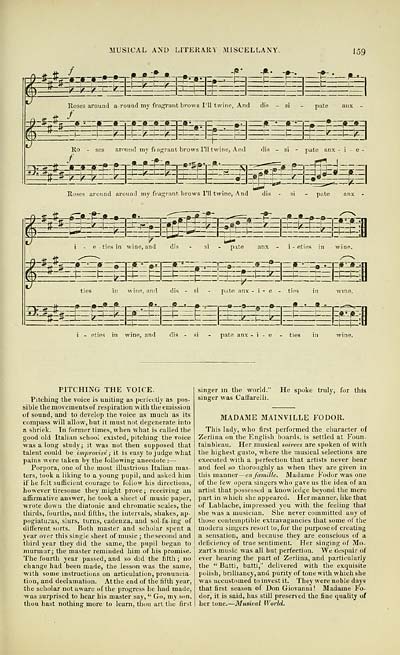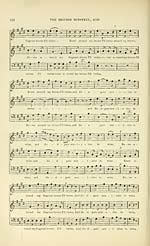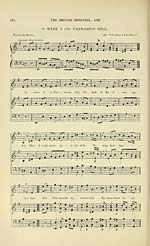Glen Collection of printed music > Printed music > British minstrel, and musical and literary miscellany
(497) Page 159
Download files
Complete book:
Individual page:
Thumbnail gallery: Grid view | List view

MUSICAL AND LITERARV MTSCELLANY.
159
/
*gzf=^^=P=Pq-^^^:
:t£=ti=|^
:!*-^
:p:
r- — -t--
h»^#:
Roses around around mj frao;i'aiit brows I'll twine, And dis - si
pate aiix
#=fc
-jL—m:
zfzwzwzw^zfsi
:t^==t-l2:
zwzwzfw--
.-=nzpi
:t
■trjr\zizzfLzzw=M:
— piziEZffq
Ko - ses around my flagrant brows I'll twine, And dia - si - pate anx - i ■ e-
/
Si3i*«=E^E^:^:
fzirtczM^ztztb
Roses around arountl my fi'a2;rant, brows I'll twine, And dis - si
pate at IX
=1=^-1
g^^gEg5i£^ | EE^
i - eties in wine, and dis - si
pate anx - i - e - tie
m wine.
PITCHING THE VOICE.
Pitching the voice is uniting as perlcctlv as pos-
sible the movements of respiration with the emission
of sound, and to develop the voice as much as its
compass will allow, but it must not degenerate into
a shriek. In former times, when what is called the
good old Italian school existed, pitching the voice
was a long study; it was not then supposed that
talent could be improvise; it is easy to judge what
pains were taken by the following anecdote: —
Porpora, one of the most illustrious Italian mas-
ters, took a liking to a young pupil, and asked him
if he felt sufficient courage to follow his directions,
however tiresome they might prove ; receiving an
affirmative answer, he took a sheet of music paper,
wrote down the diatonic and chromatic scales, the
thirds, fourths, and Hfths, the intervals, shakes, ap-
pogiaturas, slurs, turns, cadenza, and sol-faing of
dili'erent sorts. Both master and scholar spent a
year over this single sheet of music ; the second and
third year they did the same, the pupil began to
nmrmur; the master reminded him of his promise.
The fourth year passed, and so did the fifth ; no
change had been made, the lesson was the same,
with some instructions on articulation, pronuncia-
tion, and declamation. At the end of the fifth year,
the scholar not aware of the progress he had made,
was surprised to hear his master say, " Go, my sim,
thou hast nothing more to learn, thou art the first
singer m the world."
singer was Caflarelli.
He spoke truly, for this
MADAME MAINVILLE FODOR.
This lady, who first performed the character of
Zerlina on the English boards, is settled at Foun-
tainbleau. Her musical soirees are spoken of with
the highest gusto, where the musical selections are
executed with a perfection that artists never hear
and feel so thoroughly as when they are given in
this manner — eiifamille. Madame Fodor was one
of the few opera singers who gave us the idea of an
artist that possessed a knowledge beyond the mere
part in which she appeared. Her manner, like that
of Lablache, impressed you with the feeling that
she was a musician. She never committed any oi
those contemptible extravagancies that some of the
modern singers resort to, for the purpose of creating
a sensation, and because they are conscious of a
deficiency of true sentiment. Her singing of Mo-
zart's music was all but perfection. We despair of
ever hearing the part of Zerlina, and particularly
the " Batti, batti," delivered with the exquisite
polish, brilliancy, and purity of tone with which she
was accustomed to invest it. They were noble days
that first season of Don Giovanni! Madame Fo-
dor, it is said, has still preserved the fine quality of
her tone.— Musjtai World.
159
/
*gzf=^^=P=Pq-^^^:
:t£=ti=|^
:!*-^
:p:
r- — -t--
h»^#:
Roses around around mj frao;i'aiit brows I'll twine, And dis - si
pate aiix
#=fc
-jL—m:
zfzwzwzw^zfsi
:t^==t-l2:
zwzwzfw--
.-=nzpi
:t
■trjr\zizzfLzzw=M:
— piziEZffq
Ko - ses around my flagrant brows I'll twine, And dia - si - pate anx - i ■ e-
/
Si3i*«=E^E^:^:
fzirtczM^ztztb
Roses around arountl my fi'a2;rant, brows I'll twine, And dis - si
pate at IX
=1=^-1
g^^gEg5i£^ | EE^
i - eties in wine, and dis - si
pate anx - i - e - tie
m wine.
PITCHING THE VOICE.
Pitching the voice is uniting as perlcctlv as pos-
sible the movements of respiration with the emission
of sound, and to develop the voice as much as its
compass will allow, but it must not degenerate into
a shriek. In former times, when what is called the
good old Italian school existed, pitching the voice
was a long study; it was not then supposed that
talent could be improvise; it is easy to judge what
pains were taken by the following anecdote: —
Porpora, one of the most illustrious Italian mas-
ters, took a liking to a young pupil, and asked him
if he felt sufficient courage to follow his directions,
however tiresome they might prove ; receiving an
affirmative answer, he took a sheet of music paper,
wrote down the diatonic and chromatic scales, the
thirds, fourths, and Hfths, the intervals, shakes, ap-
pogiaturas, slurs, turns, cadenza, and sol-faing of
dili'erent sorts. Both master and scholar spent a
year over this single sheet of music ; the second and
third year they did the same, the pupil began to
nmrmur; the master reminded him of his promise.
The fourth year passed, and so did the fifth ; no
change had been made, the lesson was the same,
with some instructions on articulation, pronuncia-
tion, and declamation. At the end of the fifth year,
the scholar not aware of the progress he had made,
was surprised to hear his master say, " Go, my sim,
thou hast nothing more to learn, thou art the first
singer m the world."
singer was Caflarelli.
He spoke truly, for this
MADAME MAINVILLE FODOR.
This lady, who first performed the character of
Zerlina on the English boards, is settled at Foun-
tainbleau. Her musical soirees are spoken of with
the highest gusto, where the musical selections are
executed with a perfection that artists never hear
and feel so thoroughly as when they are given in
this manner — eiifamille. Madame Fodor was one
of the few opera singers who gave us the idea of an
artist that possessed a knowledge beyond the mere
part in which she appeared. Her manner, like that
of Lablache, impressed you with the feeling that
she was a musician. She never committed any oi
those contemptible extravagancies that some of the
modern singers resort to, for the purpose of creating
a sensation, and because they are conscious of a
deficiency of true sentiment. Her singing of Mo-
zart's music was all but perfection. We despair of
ever hearing the part of Zerlina, and particularly
the " Batti, batti," delivered with the exquisite
polish, brilliancy, and purity of tone with which she
was accustomed to invest it. They were noble days
that first season of Don Giovanni! Madame Fo-
dor, it is said, has still preserved the fine quality of
her tone.— Musjtai World.
Set display mode to: Large image | Transcription
Images and transcriptions on this page, including medium image downloads, may be used under the Creative Commons Attribution 4.0 International Licence unless otherwise stated. ![]()
| Special collections of printed music > Glen Collection of printed music > Printed music > British minstrel, and musical and literary miscellany > (497) Page 159 |
|---|
| Permanent URL | https://digital.nls.uk/91440909 |
|---|
| Description | Scottish songs and music of the 18th and early 19th centuries, including music for the Highland bagpipe. These are selected items from the collection of John Glen (1833 to 1904). Also includes a few manuscripts, some treatises, and other books on the subject. |
|---|
| Description | The Glen Collection and the Inglis Collection represent mainly 18th and 19th century Scottish music, including Scottish songs. The collections of Berlioz and Verdi collected by bibliographer Cecil Hopkinson contain contemporary and later editions of the works of the two composers Berlioz and Verdi. |
|---|

